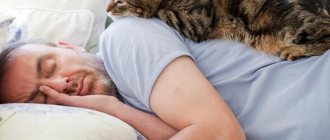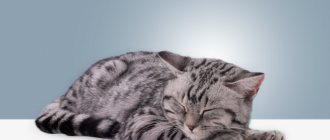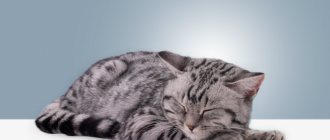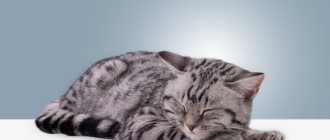Cats communicate with each other in a variety of ways. These animals prefer to “talk” to humans in the language that is most understandable to them: by giving sound signals. To a caring owner, the nature, intensity and duration of a cat's meow (or other sounds) can explain what information the pet is trying to convey to him. If a person has recently brought home a new tenant, and the kitten meows all the time, then it is necessary to figure out what the animal wants to say, what is bothering him. Kittens meow for a variety of reasons.
Longing for mother
If a kitten has just moved to a new home, then there may be many reasons why he is making meows and other sounds. All of them will be discussed below, and the first will be called longing for a cat mom.
It is recommended to adopt kittens at 1.5-2.5 months. At this age, they already know how to feed themselves and have learned most of the “cat wisdom.” However, separation from the mother still brings discomfort to the kitten. He can meow pitifully and look for the usual warm barrel.
You can help a small pet by taking him in your arms when he is crying pitifully, warming him with your own warmth, stroking him, caressing him. It is advisable to talk to him in a peaceful and calm voice.
Often kittens wake up at night and, not feeling the usual warmth and smell, begin to meow. At such moments, it is important to calm the pet with tactile contact. Over time, the kitten will stop looking for its mother. The time to get used to new conditions varies from person to person, but as a rule, it does not last too long.
How to accustom a cat to your hands
It is worthwhile to tame a cat gradually. The younger the animal, the easier it is to do this. If the kitten responds to affection, then as soon as he starts to worry and hit his tail, you should immediately let him go. These are signals that he is tired of it and has a lot of urgent matters to deal with. If he responds to affection, you can use the following techniques
- You should not pick up a cat if you smell of alcohol, citrus fruits or perfume. Any cat does not like a strong smell and will never sit on the lap if the owner smells strongly; You can attract his attention with food that is tasty for him. Cats instantly react to edible smells and jump into your arms if they see that something tasty is in store for them; An affectionate kitten will happily sit in your arms if you play with him. If the cat starts to fuss, attract his attention with food. The cat does not like to be grabbed and for this reason does not sit in your arms. Avoid sudden movements and do not try to hold her by force - she will remember this; If a cat is afraid of heights, you need to hold it under the armpits with one hand and support its hind legs with the other. She will not experience a feeling of weightlessness and fear; Another reason why a cat does not like to sit on hands is sudden movements and pinches. The cat can sit quietly on your lap when it is not being squeezed. Therefore, it is better to gently stroke him, but not to press him to yourself; Another way to get a cat to sit on your hands is to smear your hands with valerian or another cat aphrodisiac. But this method does not work if the kitten is under one year old; Don’t drive the cat away if he starts wanting to jump on your lap, even if you don’t have time. If you alternately caress him and then chase him away, it will be difficult to get affection from him; Teach children to carefully handle animals, especially adults. A cat may be afraid of children and will not sit on their lap; The treatment should be smooth and friendly. The cat will sit with an owner who does not scream, is calm and is not an angry person. The cat does not like to sit in the arms of aggressive individuals, especially males.
Hunger
A kitten may give a vocal signal for a completely natural reason: it is hungry. This is the most common reason why animals meow. This applies to both children and adult pets. First of all, any living organism tries to satisfy its nutritional needs. And the kitten, once in a new place, first learns where the “food source” is located. Not finding food, the small animal begins to worry, and then declares its needs to the person.
It is advisable that there is always some food in the bowl; this will save the owner from constant plaintive cries.
In some cases, the cause of meowing is pseudo-hunger. That is, the kitten is full, but with the help of its voice it tries to beg for tidbits. Usually this characterizes the pet in a certain way: he wants to dictate conditions, tries to beg for something tasty, and thereby force the person to follow his lead. As with children, you need to be firm. You cannot indulge your pet's first desire. This does not mean that an animal should not be pampered at all, but in childhood this is especially fraught with consequences. If a person does not want to constantly endure impudent extortion from the cat, then he should make it clear from the very first attempt who is boss in the house. The pet must understand that nothing will be given to him upon request, and the decision as to whether he will receive a treat or not will be made solely by the “senior”.
Why does a cat squeak instead of meow?
Just like people, cats have different personalities.
Every cat is different from other cats, and this can be seen in their behavior and habits. You can also see it in their voices. The difference in the cats' personalities accordingly reflected the difference between similar voices. In the same way, cats communicate and share information about their world. If you try to listen closely, you will find a range of vocals.
Although the list is longer, a few specific vocalizations worth mentioning are meows, hisses, purrs, and growls. Some of these voices are used to express anger, fear or anxiety; others will tell you about ease and contentment.
The inability to meow is one of the problems that worries people who have cats as pets. In such cases, cats often communicate with people by squeaking.
Stressful state
The constant meowing of a kitten when it has just arrived in a new home is associated not only and not so much with longing for its mother, but with stress from the new space and smells, and the need to master an unusual environment. In the first days, a kitten may be simply scared in a new apartment; he experiences loneliness and feels helpless.
If other animals arrive at the same time, this is a source of additional stress. After all, you need not only to master the space, but also to seek contact with new animals.
The owner needs to calm the animal down, talk to it affectionately more often, pick it up, and stroke it. Over time it will get used to it. To make this happen faster, experts recommend that when picking up a cat from a breeder or cattery, ask for something with a familiar smell to the animal. This could be the bedding on which the kitten is laid when it begins to meow pitifully. The native smell, reminiscent of his mother, will calm him down.
Obvious reasons
Meowing of varying degrees of volume, and sometimes frankly persistent yelling, can be heard at any time of the day: in the middle of the night, early in the morning or during the day. And if for oriental breeds such behavior is considered within the norm, then for other cats it is a signal that something is bothering them.
The cat meows and asks for a cat
Hormones. This is the first thing that may come to mind when a cat that has left childhood begins to bother you with its frequent meows. Absolutely all mature, non-sterilized cats, as well as non-castrated cats, behave this way. Not only psychological, but also physical discomfort is caused by the lack of opportunity to have offspring.
In addition, a loud cry is a signal to individuals of the opposite sex that they are ready to mate. Such “concerts” will be repeated regularly, and when adopting a kitten, you should immediately decide for yourself whether you will sterilize it, or will have to put up with loud meowing and patiently wait for the end of the difficult period.
The cat does not leave the owner due to attention deficit
Cats, like all animals, love affection.
Attention deficit
Sometimes cats may meow in hopes of attracting the attention of their owners. They quickly begin to understand that people immediately react to loud sounds, and thus try to achieve what they want, most often - some favorite treat
But it happens that a cat is forced to spend most of the day at home alone, and when his beloved owners meet, he begins to meow loudly
In this case, it is enough to simply pay attention to him: play, pet him, communicate affectionately, honor him behind the ear. If your pet is left alone for a long time, you should provide him with food and toys so that he has something to occupy himself with.
Finding a toilet
A small animal may scream in confusion, not knowing where to relieve itself. In such cases, you should put him in a tray and, if possible, explain why this device is needed. Even if the kitten is accustomed to the tray, in a new place he may not understand what this piece of furniture is for, so it is necessary to show it. By the third or fourth time, the animal will definitely understand the purpose and location of the toilet. In some cases, once is enough.
If a kitten comes to a new home at a very early age (up to a month), it may be in pain if it wants to go to the toilet. The fact is that a cat constantly licks newborn kittens, and this action has different purposes. Mom doesn't wash the babies as much as she massages them. This stimulates the kitten's still weak intestinal peristalsis. In such cases, the owner needs to gently massage the pet’s tummy, starting the process of defecation.
What else is connected with the fact that the cat does not let you sleep at night?
Banal boredom can also bring an animal to such a state that it will annoy those around it with its screams. This can happen if the other day the owner, for example, just let his cat out for a walk in the yard, without having the intention of doing this regularly. Having appreciated such a wonderful walk, the animal quite logically begins to demand it again and again. Moreover, it’s boring to sit in an apartment, and there are so many interesting things to do outside. So the cat performs a “concert” under the door.
A person is accustomed to thinking that he is the one in control of everything, but we should not forget that pets have their own nature, needs and characteristics. Therefore, in many ways, they can look at things completely differently, unlike their owners. And if a person thinks that a cat is behaving “badly” for no reason, this does not mean at all that it is so. It is worth studying your pet’s habits more carefully and observing it more closely.
Demanding attention and affection
Although cats show individuality, sometimes they behave like royalty who do not care about others, they still need communication. In the house where he was born (except for exceptional cases when the baby is left without a mother immediately after birth), the kitten always has playmates. These are brothers and sisters and a mother cat who explains the rules of behavior to the baby and instills the necessary skills. Finding itself alone in new conditions, the kitten will seek the company of a person, ask to play with him or pet him.
Outdoor games with a kitten will not only ensure its normal physical and mental development. Having played enough and been properly tired, the kitten will stop wandering around at night and bothering its owners with screams.
Tip #2
If you cannot curb an overly active pet with attention and affection, you will have to be strict.
Remember that under no circumstances should you hit a kitten: after just one time, it will remember it and will experience fear and mistrust of its owner, and this is fraught with serious consequences. Due to a constant sense of danger, the animal may experience mental disorders that will make it inadequate. In addition, cats are very vindictive. Therefore, being strict with a kitten means a gentle click on the nose or a splash of water from a spray bottle. Another method is to lightly grab him by the scruff of the neck, as his mother did with the kitten recently. But all this needs to be done only at the moment of prank: cats have a very short memory, and within a few minutes after the prank the animal will not understand why the owner is doing this to him.
Onset of puberty
Different breeds of domestic cats reach puberty at different times. Most young individuals are ready for intercourse by 6-7 months. In some breeds, such as Maine Coons, it may begin at this age, but last slightly longer, up to about 15 months.
The play of hormones, the powerful instinct of procreation felt by a young animal, makes it restless. It will scream loudly at any time of the day, roll on the floor, and demand to be let out into the street.
During this difficult period, some individuals may show aggression towards humans. Cats begin to mark their territory, and their smell at this time intensifies several times thanks to hormones.
The owner of a domestic cat should immediately decide on a solution to this problem. There are actually two of them: castration (sterilization) or providing the opportunity for the realization of instinct. In all other cases, the animal will experience real agony during periods of sexual heat. There is no need to be afraid to sterilize an animal if the owner’s plans do not include breeding cats. Veterinarians believe that this simple procedure not only does not cause harm, much less moral suffering, to the animal (they simply have no morals), but even prolongs life and preserves health.
Psychological atmosphere
The cat will sit in your arms in a calm state and environment. Noise, loud television, screams and scandals cause him tension and he does not want to sit in anyone's arms. The cat does not like to sit in the arms of some people who smoke, who are aggressive even towards them, who abuse alcoholic beverages, or who are sloppy. It happens that she categorically does not accept a family member and this cannot be changed. You can only gradually teach a cat to sit in your arms if you treat her with care and affection, avoiding coercion, and then sooner or later she will reciprocate and affectionately.
Do you know when your cat is in pain? "Certainly!" – many will rush to answer with confidence. But not everything is so simple; “seeing” a cat’s pain is not at all as easy as it might seem at first glance.
Cats hide their pain, and this is natural for them. Unlike dogs and some other animals, cats can behave quite normally in appearance, despite pain. They do not publicly demonstrate their pain, but, left alone, they begin to intensively lick the sore area.
So why do cats hide their pain? The main reason is the instinct of self-preservation. In nature, a sick or injured animal is extremely vulnerable to attack. The wild ancestors of the cat tried not to make unnecessary sounds, quickly find a safe shelter and hide there. Cats are not herd animals, unlike dogs, for whom open display of their emotions helps to gain support. The cat will hide the pain until the last moment, as long as it has the strength.
Studies have shown that when an animal experiences pain, it begins to intensively produce endorphins, which affect the emotional state and dull sensations.
Cats do not show pain in the way we are accustomed to, the way we ourselves and some other pets would. Because of this feature, veterinarians and cat owners have long mistakenly believed that cats do not experience pain at all. But this is nothing more than one of the many myths about cats.
If there is no contact and trust between a cat and its owner, it will endure and hide its problem until the last moment. Severe pain is a major biological stressor and affects numerous aspects of an animal's physical health, including wound healing and resistance to infectious disease. Studies have shown that surgical cats whose pain is controlled before and after the procedure recover much better than those whose pain was not properly addressed.
Pain varies
The pain can be acute or chronic. If acute pain is usually quite easy to see, since the circumstances under which it arose are obvious (trauma, surgery, etc.), then chronic pain is more difficult to notice: there are no obvious damage or changes in behavior. Nevertheless, chronic pain detected in time can save a cat’s life, since it is an important symptom of the disease.
Causes of Acute pain
may be: surgical trauma; fractures of limbs and other bones; injuries received as a result of accidents; diseases of the genitourinary system; corneal ulcers.
Most Common Causes of Chronic Pain
– arthritis (osteoarthritis and degenerative joint disease), pain due to diseases such as cancer. The animal suffers from chronic pancreatitis (inflammation of the pancreas), chronic wounds, chronic cystitis.
In addition, animal psychologists say that cats can experience emotional pain
and a feeling similar to grief in people.
Determining whether your cat is in pain is like playing detective: you must carefully observe and evaluate the slightest changes in your pet's behavior.
First, draw analogies with yourself. If a cat is undergoing surgery, is injured, or has a “human” disease that causes us pain, we can assume that the cat is also uncomfortable.
Secondly, pay attention to the slightest changes in your pet’s behavior. This is the first sign of pain or an incipient disease. The better you know your cat and its habits, the faster you can understand that something is wrong with it. To recognize pain, you need to know what behavior is normal for a cat: its activity level, gait, appetite, water intake, duration of sleep, sleeping position and other features.
What signs might indicate that a cat is in pain?
1. Behavior change
If a super active cat suddenly starts sleeping most of the day, this could be a sign of illness. This is also indicated, on the contrary, by the hyperactivity and restlessness of a usually calm cat.
The animal may lose interest in its favorite food and water, and its food preferences change.
The cat may become irritable and even show aggression towards other pets or people.
A sign of pain may also be a lack of desire to visit your usual favorite places. For example, a cat used to like to sit on the windowsill or on the head of the bed, but now you don’t notice it there. If she has stopped jumping as often and high as before, has difficulty climbing stairs, there has been a decrease in her motor activity in general, a change in her sleeping place to one that is easier to reach - all this is abnormal.
One of the common problems in older cats is teeth. Therefore, if your pet has become angry and gloomy, it is unlikely that it is simply due to old age. Perhaps the cat is suffering from sore teeth, and once this problem is solved, she will be as cheerful again.
The cat shows in every possible way that it wants to be left alone. If she begins to growl or hiss when she is petted, touched or picked up, this is a sure sign that something is bothering her.
3. Finding a secluded place
The cat knows that pain makes it vulnerable, so it will try to hide or find a safe haven. Thus, she will be able to avoid encounters with stronger animals and not become their victim. Therefore, the animal can reduce communication with owners and other pets.
4. Sleeping too long or sleeping in one position
Pay attention to the position in which your cat sleeps. If she begins to choose one position, especially if this was not typical for her before, think about it: perhaps there is a problem behind this.
5. Licking the same area
Cats experiencing pain, in the hope of finding relief at the site of its localization, often and persistently lick the area. So, with a relapse of cystitis, cats may begin to intensively lick their belly.
6. Reluctance to take care of yourself
Being dirty and unkempt is not normal for adult animals. Cats are notoriously clean people and are great at grooming themselves. Therefore, if a pet has lost interest in its appearance, this is a reason to show it to the veterinarian.
7. Staring at nothing
Glazed and wide open eyes, especially coupled with an unnatural posture, often indicate that the animal is in great pain. The eyes in general can be an indicator of pain in a cat, regardless of whether the pain is located in the eye itself or in another part of the body. Cats in pain will have dilated pupils.
8. Changes related to the “toilet” issue and visiting the litter box
Cats with joint problems may find it painful to sit on the litter tray “as usual.” In this regard, urine may end up above the sides of the “toilet”.
9. Constant purring
A cat's purring is a means of communication and self-healing. She purrs not only to bring us joy and to show other cats that she is friendly towards them. In this way, the animal can calm down: it makes similar sounds in stressful situations, during childbirth and injury.
Various studies have shown that with the help of purring, cats are able to reduce their pain and even speed up recovery. Sound vibrations in the frequency range of rumbling promote healing and increase bone density. Your cat's constant, incessant purring is a good reason to pay attention to her.
If you notice the “suspicious” behavior of your pet described above, take it to a veterinarian for examination; do not try to diagnose the cat yourself. In addition to the fact that pain is just a symptom of the onset of a disease, be aware that many pain medications for humans are contraindicated for cats. Consult your doctor, he will prescribe the drug, dosage and dosage interval.
Irina KOSTYUCHENKO, felinologist
Nadrukavana ў “Native Prirodze”
Have you recently gotten a kitten? These soft little bundles grow quickly and have many different needs. The kitten may scream often, which deprives the owner of peace. To calm a kitten, it is important to determine the cause of the cry and help the pet. This will strengthen the connection between you.
How to determine the cause of screaming
Learn more about kitten development.
Kittens go through several stages during their growth process. Knowing these steps will help you understand why your kitten is squeaking and calm him down. There are three stages in total:
Determine the reason for the scream.
Kittens can squeak for a variety of reasons, from hunger to fear due to early separation from their mother. If you know why your kitten may cry, it will be easier for you to distinguish between different types of cry and find a solution to the problem. A kitten may scream because:
Remember that kittens can make sounds.
You may think that your kitten cries too often, but this may be his way of communicating with the world. Understanding that all cats meow and scream, and that this is normal, will help you get used to the sounds.
Take the kitten to the vet.
If you don't know what causes the crying or are concerned about your pet's health, take your kitten to the vet. The doctor will determine the cause of the scream and explain to you how you can calm the animal.
- Tell your doctor when your kitten starts meowing a lot. Explain whether certain things make the screaming worse or worse. Remember how long the kitten was near its mother and other kittens. Bring your kitten's medical card with you if you have one. Answer your doctor's questions honestly so your kitten can get the help it needs.
How to calm a kitten
Take the kitten in your arms.
Many cats feel calmer when they sit in a person's arms and when they are petted. It reminds them of the feeling of being near their mother. Regularly holding a kitten in your arms will socialize the animal and help it develop properly.
Stroke the kitten carefully.
This can be done next to the kitten, and when it is in your arms. This will calm the animal, stop the screaming and promote the formation of attachment.
Talk to the kitten.
Human interaction is an important factor in a kitten's development and bonding. Talk to your kitten whenever he cries and when you interact with him. This will let the kitten know that you are paying attention to him.
Play with the kitten.
Play is an important part of a kitten's development and bonding. Screaming may indicate that your kitten wants your attention, and playing is a great way to give your kitten that attention.
Provide your kitten with a comfortable bed.
A comfortable place to sleep will calm your kitten and he will meow less. Buy a special cat bed or put a soft towel or blanket in the box.
The article allows you to understand whether such a situation is normal or not and how best to behave in this case in order to achieve the best result for the kitten and prevent it from getting sick, because sometimes such a situation indicates an illness.
The kitten meows and cannot go to the toilet or meows when walking around large and small
There are several probable reasons why a kitten cannot go to the toilet and meows when it walks big and small. These could be diseased kidneys, worms, inappropriate nutrition and a number of other equally significant reasons.
It is better to consult a specialist on this matter.
Why does a small kitten meow without voice and sound and stop, does not find a place for a reason?
There are breeds of cats that are too talkative, meowing with or without reason. In particular, these are the Kurilian Bobtail, Bengal, Siamese and Abyssinian cats. However, even a kitten of the presented breeds should not meow non-stop.
It is obvious that something is bothering the baby, or he was taken away from his mother too early.
The kitten constantly meows, but does not want milk, what should I do?
Contrary to popular belief, milk from cows or goats is harmful to kittens. If the kitten is hungry, then fermented milk products, cottage cheese, egg yolk and finely chopped meat (except pork) can successfully replace cat milk.
What to do if the cat does not sleep at night, walks and meows, what does this mean?
Perhaps the cat felt like an adult and his nightly vigils are associated with the desire to satisfy his sexual instinct. If breeding kittens is not part of the owner’s plans, then it is better to castrate the animal.
The kitten meows near the front door and on the front door or when I'm in the bathroom
This behavior of the kitten is most likely caused by the lack of attention that the small pet experiences. However, if you follow his lead, it will become much more difficult to wean an adult cat from the habit of meowing when the owner leaves the visibility zone.
Here it is important to find a “golden mean” and learn to ignore the unreasonable demands of the animal.
Why does a cat meow with a hoarse voice in the morning, after eating, on the first day after leaving the nursery?
Meowing in the morning, after eating and on the first day after leaving the kennel, if the cat is not sick, can be explained by your pet’s desire to communicate.
Why does a kitten meow when you pick it up during play?
A kitten may meow when you pick it up during play because it is in pain or discomfort, or to express its annoyance at interrupted play.
In this matter, many people have ambiguities, which can be sorted out in the material of this article, written in the format of questions and answers. If os.
Among the latest innovations that have been prepared for pets, it is worth paying attention to the new solution for transporting dogs in vehicles.
Diseases and conditions requiring medical attention
A kitten may cry and meow loudly because something hurts. The cause of pain may be poor digestion or a serious illness. It is necessary to carefully examine the pet and observe its behavior.
The following symptoms should alert the owner:
- increased body temperature, dry nose (in cats the normal temperature is about 38 degrees, in a kitten this figure can vary significantly, since the process of thermoregulation has not yet been established);
- prolonged cleanliness in the tray or, conversely, diarrhea;
- blood in the urine or stool;
- vomit;
- loss of appetite or complete refusal to eat;
- discharge of various types from the eyes, ears;
- swollen, hard tummy;
- impaired coordination of movements.
You should also observe how often the kitten itches. If he constantly bites himself, gnaws something in his fur, or scratches himself heavily, this is a sign of infection with ectoparasites. If these symptoms appear, you should immediately show the animal to a veterinarian. He will determine the cause and prescribe the necessary treatment.
Methods of helping a kitten
The kitten should be taken away from its mother no earlier than 1.5-2 months. By this age, animals are already sufficiently socialized and trained in all the necessary skills. At first, the baby will still look for his mother, so the owner needs to pay more attention to the pet and talk to him more often. The animal should be provided with toys that will distract its attention and help pass the time while it is left alone. Returning home, you can hear the kitten's pitiful cries. This can mean both a joyful greeting and complaints of loneliness and hunger. In any case, you need to immediately pick up the kitten, pet it, and then feed it. Over time, a caring owner will learn to understand what exactly the pet is “telling” him.
If circumstances were such that the kitten had to be adopted very young, then for some time the person will have to become its mother. A newborn cat needs to be fed constantly, once every two hours. At 2-3 months the cat is switched to six meals a day. By 6 months, the number of feedings is reduced to 4 times, and by a year - to two.
A small kitten also needs abdominal massage to keep its bowels moving smoothly. You need to do the procedure after eating, and then put the baby in the tray.
The owner will also have to solve the pet’s sexual problems. When meowing expresses the animal’s desire to procreate, you should contact a veterinarian. It is recommended to castrate and sterilize cats between 8 months and a year. If the vocalizations that indicate puberty have begun early, your veterinarian may recommend hormonal or sedative medications for cats. It is advisable not to prescribe medications to the animal yourself, but to leave it to a specialist.
Causes of rapid breathing
Frequent breathing in an animal can occur due to pathological and physiological reasons. If we are talking about hot weather or the postpartum period, the cat’s condition is quite justified: its body is experiencing a stressful situation. Over time, breathing will stabilize, so you just need to wait a while and help your pet as much as possible. But often frequent breathing can mean that the animal has some pathologies or diseases. In this case, you need to contact a veterinarian as soon as possible.
Cat with ascites
Pathological
Rapid breathing in a cat may indicate the presence of pathology
It is worth paying attention to other symptoms in order to say with confidence what kind of disease the animal has. It is recommended to contact your veterinarian first if your kitten begins to pant rapidly.
The following are related to rapid breathing:
- blood diseases;
- pathologies of the heart, lungs;
- an increase in the size of internal organs due to the presence of certain pathologies;
- ascites;
- increase in abdominal pressure.
For your information! Lung disease can be considered the entry of a foreign organ into the respiratory tract, trachea or bronchi. But often a cat’s breathing becomes faster due to narrowing of the airways due to spasm or the presence of tumors. There may also be problems with the expansion of the lungs.
If breathing problems occur that are accompanied by additional symptoms, it is necessary to keep the cat under constant observation so that its condition can be assessed. You should not make a diagnosis and start treatment yourself, as this can harm your pet.
Physiological
Heavy breathing may occur in a mother cat who has just lambed. The animal’s body is experiencing stress at this moment, since childbirth is a difficult process. Do not be alarmed by the cat's shortness of breath at this moment, since breathing should soon stabilize.
Your pet may breathe quickly and stick out its tongue due to overheating. They don't have as many sweat glands as humans do, so they have to open their mouths to cool off. Also, rapid breathing in an active cat appears after physical activity. In this case, dilated pupils can also be observed.
Blue mucous membranes in a cat
If a cat is breathing frequently after surgery (even if it was castration or sterilization), then you should not panic right away: the animal is going through the process of recovery from medications. If gradually the depth and frequency of breathing begin to return to normal, then you should completely postpone the alarm.
However, there are cases when this process gets worse. It is necessary to check the animal's gums, lips and nose. If they acquire a bluish tint, you should immediately contact a veterinarian, since such symptoms are a complication of the respiratory or cardiovascular systems.
When worried, cats also begin to breathe heavily. It is necessary to look at how the animal looks: it flattens its ears and looks frightened, it hides or attacks in a stressful situation; a sick animal does not behave this way.
Note! Animals can dream too, so if your pet begins to breathe rapidly during this dream, there is no need to worry. Not everyone can sleep without dreams, but everyone will react to what happens in dreams











